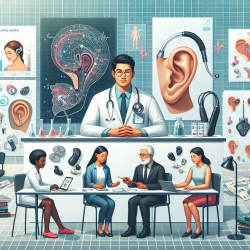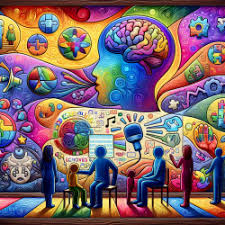Introduction
In the realm of speech-language pathology and therapy, understanding the multifaceted nature of brain functions is crucial. Recent research, such as the case report titled "Psychosis following a stroke to the cerebellum and midbrain," offers valuable insights into the complex interactions between neurological events and psychiatric outcomes. This blog aims to distill key findings from this research and explore how practitioners can leverage these insights to enhance therapeutic outcomes for children.
Research Overview
The case report details a 56-year-old man who developed persistent psychosis following a bilateral cerebellar stroke with midbrain involvement. This condition manifested as persecutory delusions, hallucinations, cognitive impairment, and a flattened affect. The study highlights the cerebellum's role beyond motor control, emphasizing its involvement in cognitive and affective processing.
Implications for Practitioners
Understanding the cerebellum's broader role can significantly impact therapeutic strategies. Here are some ways practitioners can apply these insights:
- Holistic Assessment: When assessing children post-stroke or with cerebellar involvement, consider both motor and cognitive-affective symptoms. This comprehensive approach ensures no aspect of the child's development is overlooked.
- Interdisciplinary Collaboration: Engage with neurologists and psychiatrists to develop a well-rounded treatment plan. Understanding the neurological underpinnings of symptoms can guide effective interventions.
- Personalized Therapy Plans: Use data-driven assessments to tailor therapy plans that address both speech-language and cognitive-affective challenges. This personalized approach can lead to more effective outcomes.
Encouraging Further Research
While the case report provides valuable insights, it also underscores the need for further research. Practitioners are encouraged to explore the following areas:
- Longitudinal Studies: Conduct long-term studies to understand the progression of post-stroke psychosis and its impact on cognitive and affective functions.
- Therapeutic Interventions: Investigate the efficacy of various therapeutic interventions, including pharmacological and non-pharmacological approaches, in managing post-stroke psychosis.
- Neuroimaging Studies: Utilize advanced neuroimaging techniques to map the cerebellum's connections with other brain regions, providing deeper insights into its role in cognitive and affective processing.
Conclusion
The intersection of neurology and speech-language pathology offers a rich field for improving therapeutic outcomes. By integrating insights from research like the case report on post-stroke psychosis, practitioners can enhance their understanding and approach to therapy. This not only benefits individual patients but also contributes to the broader field of pediatric therapy.
To read the original research paper, please follow this link: Psychosis following a stroke to the cerebellum and midbrain: a case report.










